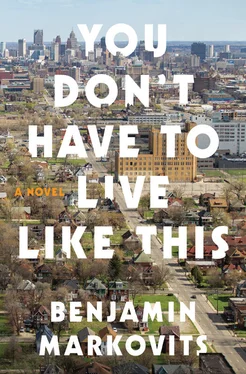“And who makes money from that? I don’t see a lot of jobs in watching metal. And where does the money go to? Let me ask you a question. If this thing works out, how many people from Detroit will be able to afford a house in one of your neighborhoods?”
“I don’t know, Nolan. But let me ask you a question. How much is your mother’s house going to be worth?”
“Only if she sells it, only if she moves out.”
On the walk home (Nolan wasn’t up to jogging back), I wanted to say something else to him, something that communicated part of what I felt, sitting with him on the floor and waiting for the cops and the ambulance to show up. Instead what I said was, “You don’t have to lump me in with the rest of them. I don’t need their house anymore. I could move in with Gloria.”
In fact, Gloria moved in with me — just for a while, while she was having some work done on her kitchen over the summer. This was two weeks before the start of school. The job wasn’t supposed to last much longer than that. But you know what kitchen renovations are like, they drag on, they become something else, and sometimes I tell myself that part of what went wrong was just that fucking kitchen.
So she moved in, with Walter and Susie downstairs, and we read the paper over breakfast, and sat in the garden, when it wasn’t full of other people’s kids, and ate lunch at Joe’s, that kind of thing. “So this is what the big deal is,” she said. “This is why people move here.” Most years she taught summer school, she’s one of those people who can’t put up with an empty hour, but for my sake she didn’t, and we had a lot of empty hours. Sometimes I worked on the newsletter, she had a little administrative catching up to do, but basically we hung out together like people in love.
I had worried about living with Walter and Susie. Gloria’s first experience of Walter’s charm wasn’t a tremendous success, Jimmy’s baptism and the party at Tony’s house afterwards. Walter could be weird around women, gentlemanly and politely sinister, and sometimes he was honestly weirdly polite and sometimes it served as a mask for ironic superior feelings. Even I couldn’t always tell the difference. But it turned out that Walter didn’t matter much, because Gloria and Susie got along so well. They both have that little-girl thing going on, in a practical good-girl way, not pink and princessy; and they shopped together, and cooked together, and worked in the yard. Walter and I drove them out to some nursery in Rochester Hills, and they came out with armfuls of plants and had to put their seat belts on between the pots. They talked the whole time. Walter and I didn’t say much. If we said anything it was probably negative-sounding and dismissive, a cover for laziness, but the truth is we were both happy to listen in — like men dependent on the women in their lives to keep up their daily interest in the world. I don’t know how much of it was phony or for show — Susie and Gloria’s friendship, I mean — or a way of getting back at us for something, or excluding us. But it wouldn’t have mattered because we were all basically pretty happy.
The first piece of trouble came when school started and Mr. Pendleton returned to work. His leg was fine; he walked with a slight shuffle, that’s all, but then Mrs. Sanchez let Gloria know there probably wouldn’t be any substitute work for me.
“Why are you telling me?” Gloria said. “Tell him yourself.”
Mrs. Sanchez must have felt awkward. I remembered her spider plants, the heating on overdrive, her framed photos of the kids. She tried to explain herself. “I thought you were in contact.”
“What does that mean?” Gloria said to me afterwards. “ In contact is not a good phrase for this. Either it doesn’t mean anything at all or it means something that’s none of her business.”
She was sort of making a joke of it, but it pissed her off, too, and somehow the funny side of it started losing out to the other side. “I mean, what does she have to say anything for? She can say something when they need you. Why does she have to tell me?”
“I got a letter, too. She probably figured it’s better to say something to you than nothing. Because I was teaching pretty much full-time by the end of last year. They had to let me know.”
“That is not what this is about,” Gloria said.
She thought it had something to do with Nolan’s trial, and maybe she was right, maybe it did. Every week new stories came out. I was mixed up in the case, there were racial overtones, and if I were Mrs. Sanchez I wouldn’t want me teaching at the school either. The classroom of a public high school in Detroit is hard enough to control anyway, but if the kids have something on you, something they can use, you’re finished. But Gloria took my understanding as a proof of laziness or, worse, a confession of guilt. And the truth is I did feel guilty about something and spent a certain amount of time trying to figure out what.
Tony was my friend, Nolan was my friend. I wanted to stay neutral. But the press didn’t help — they made it hard to stay on the fence. In those first weeks and months, The Detroit News ran a number of articles, mostly about Nolan. I guess they wanted to own his side of the story — for a lot of people, this was an opportunity. The gun Nolan carried with him belonged to his dead brother. He kept it for sentimental reasons; it was never loaded. There was also speculation about what knocked him out, and the long-term health consequences. Nolan had a heart condition. Apparently, this is one of the reasons he quit football. The standard physical exam, which every college athlete goes through, revealed hypertrophic cardiomyopathy. African Americans have a high rate of this disease; athletes are particularly at risk. One piece suggested that maybe he was having a heart attack while Tony and I were at his mother’s house, drinking lemonade.
Other things came out, too. The Free Press published a story about Clarence’s mother, a woman named Martha Brett, who wanted to move to Arizona and had petitioned the court for permission to relocate her son. Her husband (she had a husband) worked for Daikin AC and had just been promoted to the office in Sun City West. Two days before Nolan kidnapped Michael, the court granted Brett’s petition. On the following day, Nolan filed an appeal and later that night he took a baseball bat to Kurt Stangel’s car. The picture painted in the Free Press was of a guy whose life was going off the rails.
“Let’s not take sides,” I kept saying to Gloria, but she said, “Sometimes you have to.”
Robert James said something funny to me about all this. His mom was in town one weekend, and they had me over for brunch. Mrs. James was worried about me, she thought I looked skinny, she wanted to feed me up. Gloria came, too; we ate pancakes. Everybody was on best behavior. We talked about the case in these abstract terms, as if the only thing it touched on was our political opinions. At one point Robert said, “You know who I blame? The air-conditioning companies. They’re tearing this country apart. Who moves to Sun City West? The only way these places are remotely habitable is air-conditioning and irrigation. But there isn’t enough water, which everybody knows. Detroit is a terrific city. So are Buffalo and Cleveland and Pittsburgh. There’s water, there’s transportation links, there’s history and culture, but because you can’t go golfing twelve months a year, everybody is moving to Arizona. These cities they are building aren’t cities, they’re brochures. But air-conditioning is going to wipe them out again, global warming is going to wipe them out. In fifty years’ time we’ll all be heading north.”
Читать дальше












